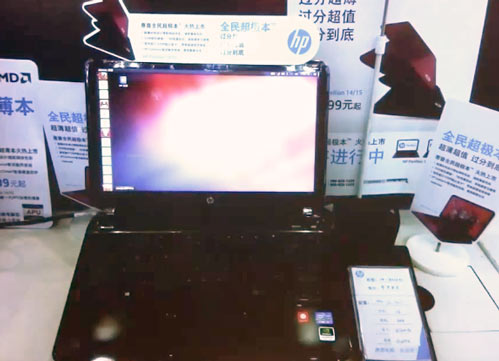Canonical’s VP of Sales and Business Development, Chris Kenyon, shared some interesting stats on Ubuntu’s uptake in the world in a presentation to attendees of the recent Ubuntu Developer Summit.
In a 30 mins long talk he revealed:
- In 2 years Ubuntu has been pre-installed on $7.5 billion worth of hardware;
- Canonical are working with leading ODMs in Taiwan;
- Ubuntu will account for roughly 9% of all global PC shipments by 2014.
Of this latter stat he adds: ‘This will be an extraordinary accomplishment’.
HP Join The Ubuntu Club
So Ubuntu’s shipping on a lot of PCs – but where are they?
ASUS have been dutifully selling Ubuntu netbooks in Europe for the last few years, announcing the addition of another 2 models to their line-up recently.
But most are being sold in emerging markets such as China. It’s there that Ubuntu has a presence in 400 Dell retail stores – putting ‘the open-desktop [in] pride of place’ says Kenyon.
But Dell and ASUS aren’t the only ones shipping Ubuntu, as Kenyon explains:
“Up until [now] we’ve only been able to talk about Dell, Lenovo and ASUS pre-installing Ubuntu. We’re delighted to have added HP to that mix.”
As proof of the HP tie-up, one of Canonical’s Beijing office employees went out to see – and took this snap:
Kenyon is aware that the impact of Ubuntu pre-installed laptops being sold in China won’t seem relevant to everyone – but it should:
“[Selling Ubuntu laptops in China] …means we’re putting the pressure on all of the hardware vendors, the guys who the drivers for the bluetooth, for the screens, for the graphics cards, for the CPU; they’re all focused on making sure their latest technologies work with Ubuntu.’
“Everyday or every week we’re in contact with industry partners, making sure that the next bit of magic to come out of the silicon factories is going to [work with Ubuntu].
Apple-esque Sales
“There’s one OEM that’s not shipping Ubuntu who we may have trouble breaking into, but I want to highlight their shipment numbers are,” he teased the audience with before announcing, to laughter, that he was talking about ‘Apple’.
‘I’m not convinced we’re going to get them to ship Ubuntu pre-installed in the next 2 years, but I do think it’s fascinating that if you look at the number of units we were shipping in 2011 it puts us somewhere between these two bars:’
The graph above appears to show that Ubuntu devices shifted more units in 2011 than Apple managed in 2007.
Now, I’m fully aware that this statistic won’t seem all that amazing to many because it’s a comparison between 2011 and 2007. Likewise one could use it to extrapolate that Ubuntu devices trailed Apple by more than half in 2011 – not exactly encouraging stuff.
But – and it’s a big but for critics to chew on- that’s still a staggering number of devices to ship with a ‘free’ OS.
“I think that’s a huge testament to the developers, the upstream contributors, and the customers for making the open desktop a reality,’ he adds.
So whilst we in Europe and America might not be able to pop into our local PC World or Best Buy and nab an Ubuntu-loaded laptop quite yet, the fact that there are Ubuntu laptops out there and that they are selling in huge numbers, is exciting stuff.
In Business
Aside from the ‘consumer world’, Kenyon also touched on corporate uptake of Ubuntu. Here businesses are turning to it for the savings it gives in time, resources, maintenance, and versatility.
As examples, Kenyon cited the German insurance company LVM Insurance, who have Ubuntu deployed on over 10,000 desktops; Consultancy firm CapGemini who are rolling Ubuntu out on 10,000 desktop in the next 2 years; Google, who have 10,000 Ubuntu-based desktops and laptops in use; and the Ministry of Defence in The Netherlands, who are using an Ubuntu-based client across a staggering 40,000 desktops.
And this will only get better as Windows XP, the dominant OS in business, reaches its end-of-life in 2014. A scenario Kenyon believes gives Ubuntu the opportunity for even more success due to its ‘security, cosy, flexibility & manageability’.
‘If you think the open desktop isn’t going to happen,’ Kenyon sums up, ‘think again.’



